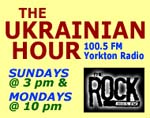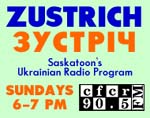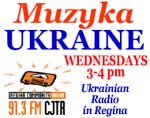|
|
| :.NAVIGATION.: |
| >Organization |
| >Branches |
| >Programming |
| >Ukrainian Education |
| >Visnyk Online |
| >Services |
| >Bazaar Online |
| >About Ukrainians |
| >Who's who |
| >Links |
| :.EVENTS.: |
| > What's New? |
| > Events Calendar |
|
:.LANGUAGE.: |
| :.COORDINATES.: |
| Ukrainian Canadian Congress Saskatchewan Provincial Council 1219 8th St E Saskatoon SK S7H 0S5 Phone: (306) 652-5850 Toll-free: 888-652-5850 Fax: (306) 665-2127 E-mail: |
 |
 |
 |
| What's New |
Holodomor
|
 A ceremony was held in Regina on Wednesday to mark the Holodomor, the Ukrainian famine genocide. Above, Deputy Premier Ken Krawetz, (left) Orisha Greschner, 10 and Ed Lysyk, Saskatchewan Provincial Council of the Ukrainian Canadian Congress, light a candle. Photograph by: Bryan Schlosser, The Leader-Post |
The packed service was held in the rotunda of the provincial Legislative Building -- fitting, as Saskatchewan was the first province to recognize the genocide by designating the fourth Sunday each November as "Ukrainian Famine and Genocide (Holodomor) Memorial Day."
That candle, symbolizing the suffering of so many, will remain lit for the remainder of this week.
The historical setting of the Holodomor was the aftermath of the Russian Revolution and the creation of the Soviet Union. Functionaries of the victorious Bolshevik side flexed their political muscles by wiping out independent farmers and nationalists in the region then known as "the Ukraine."
There were so many dead from this enforced famine that losses can only be estimated -- between seven and 10 million people, said Gerald Luciuk, chairman of the Saskatchewan-Ukraine Relations Advisory Committee.
Memorials like this are "a constant reminder of the cruelty that mankind can inflict on its members" -- in this case, those who for political reasons are "deemed unworthy."
Noting some people "seek to diminish its importance," Luciuk said "it's important that we gather here today to remember those who died and to make sure such a tragedy will never, ever happen again."
Saskatchewan's deputy premier, Ken Krawetz, said the tragedy of the famine was compounded by Soviet authorities' success in suppressing news of it for decades.
"Within this sadness and despair, we say, 'We will not let this human tragedy fade from our collective memory.'"
Ed Lysyk, president of the Saskatchewan Provincial Council of the Ukrainian Canadian Congress, said the famine started with Soviet authorities' "exorbitant grain quotas" on farmers, whose grain was "confiscated down to the last seed."
The region was sealed off by army units, which allowed nobody to flee.
Asked in an interview if there are still deniers of the Holodomor, Lysyk said, "Absolutely!"
He listed politicians in modern Russia who interpret criticism of the old Soviet Union as criticism of Russia, plus some in Ukraine who want good relations with their powerful neighbour.
"This is one of the reasons we, in the diaspora, need to build international pressure so they know they have to do what's right -- they have to follow their hearts and not try to curry favour with another country by altering their history."
© Copyright 2010 The Regina Leader-Post. Used with permission.
